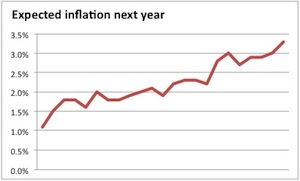A tired but trusty metaphor for policymakers using interest rates to control inflation is that it’s a bit like pulling a brick across a table with a rubber band.
Think about it: Pull, pull, nope, nothing, “Are you sure this rubber band is really attached to it?” then – WHAM! – a brick flying towards your face.
That’s inflation for you. It can ramp up far faster than expected, and it’s non-trivial to stop it once it does.
A little bit of inflation is considered good for an economy. By slowly eroding the value of money, it forces those who have it to put it to productive use, rather rather than hoarding it under a mattress (or in gold for that matter).
Inflation is also favoured because the alternative – deflation – is a nasty and unsolved problem in economic policy. Just ask the Japanese.
Finally, governments like inflation because it erodes the value of outstanding public debt, and with far fewer complaints from voters than the alternatives of raising taxes or cutting spending.
But high inflation can be ruinous to investors, and really high inflation can wreck entire countries.
Inflation ahoy? Who knows
You may be reading this in February 2011, or you may be reading it in 2020, or on any day in-between. Whatever the date, I guarantee that someone out there is writing that inflation is about to go much higher.
Like the poor, the fear of inflation is always with us. Sometimes it proves well-founded, and the various mooted causes – rising commodity prices, excess liquidity, low interest rates, labour shortages, and many more – turn out to have been spot-on.
At other times, the trigger – low unemployment, say – doesn’t produce the inflationary spiral that the inflation-wary expected. The first decade of the 21st Century was much like that.
But it’s no surprise to me that it’s so hard to predict inflation. Our main tool against it is interest rates, and interest rate expectations are intimately linked with government bonds.
If you could know with any degree of certainty that high inflation is on the way (or, equally, that it’s definitely not) then you could capitalize on it by buying or shorting government bonds.
It’s a very simple trade, with few other risks associated with it – unlike investing in shares or corporate bonds, say.
For that very reason, tens of trillions of dollars is wagered in the government bond market worldwide, utterly dwarfing the equity market. This bond market sucks up the brainpower of thousands of smart people who are paid a small fortune to guess the direction of interest rates.
If you think you know better than this vast voting machine because, for example, you read on a blog that Mexicans are having a stand-off due to a tortilla shortage, then please get over yourself. 1
Over the top inflation
Another problem for DIY inflation forecasters is that inflation has wicked feedback loops.
Fears of high inflation can become a self-fulfilling prophecy, as workers push for higher wages and consumers and companies start stockpiling. Alternatively, the prospect of higher interest rates to come to tame the inflation can curb spending and borrowing, and stop companies investing in expansion – even before rates have moved by very much.
Spare a thought for Central Bankers, who are tasked with having a monthly stab at it. The Bank of England got it right for a while, but for the past few years it’s overshot the target more often than an English striker in a World Cup match.
Perhaps that’s not surprising, given the recent climate: The usual mental Jenga of setting rates to try to influence inflation in 12-18 months time has been complicated by a financial meltdown that threatened to send us back to the Stone Age (or at least the gold standard). Mystic Meg would have got a migraine.
In 2009, for instance, I feared quantitative easing and record low rates would eventually spawn inflation in the UK (and loaded up on shares on the back of it) but it’s hard to prove the link so far. Yes, we have high inflation as I write, but it’s mainly imported through the weaker pound and higher commodity costs, topped off with the impact of VAT tax changes.
UK QE can be blamed for the weaker pound, but it hasn’t driven the oil price. And for its part the US has so far seen very little domestic inflation, despite its own massive QE operations and super-low interest rates.
But – and appropriately, for our American cousins, it’s a big but – the size of the US economy means in contrast it IS conceivable that cheap dollars are putting a light under commodity prices and emerging markets, and thus that US QE is fueling inflation that will be imported back home.
Conceivable, but so far unproven. All we know for sure is that inflation in the US has yet to spiral out of control, despite two years of pundits egging it on.
Well, apart from those many pundits who feared deflation, of course. I mocked them at the time, but as I said at the start you try to predict inflation and interest rates at your peril, so it doesn’t pay to be too smug.
Inflation always takes the house
In summary, sometimes the inflation hawks (those who want to raise rates to head off inflation) turn out to be right, and sometimes the doves (those who’d dial rates back because they don’t see any threat from rising prices) are the ones who can say they told you so.
History, as ever, remembers the winners. Still, that’s more than most bloggers, who seem to remember neither the winners nor the losers, but rather just that morning’s headlines.
Instead of being a hawk or a dove on inflation, as private investors we should play chicken to protect our wealth. This means having a healthy fear of the consequences of inflation, but not going crazy at every headline (that just makes you a headless chicken).
In particular, don’t let short-term stock market phobia cause you to invest too much of your long-term savings in low-yielding and/or fixed rate investments that have no ability to respond to inflationary shocks. Shares are much more volatile over the short run than bonds, but they more than make up for it by offering some protection from ever-rising prices over the long term.
In most of the world, for most of modern history, inflation has inexorably reduced the value of money over time, like water dripping onto an apparently impervious stone floor. It’s how your grandfather bought his first 3-bed house for £1,000, and it’s why your father thinks you spent too much on yours.
Drip. Drip. Drip.
Worried? Read my 10 ways to stop inflation eroding your wealth.
- Note: I speak as someone who regularly does have a guess! I am only human, and not quite over myself.[↩]




